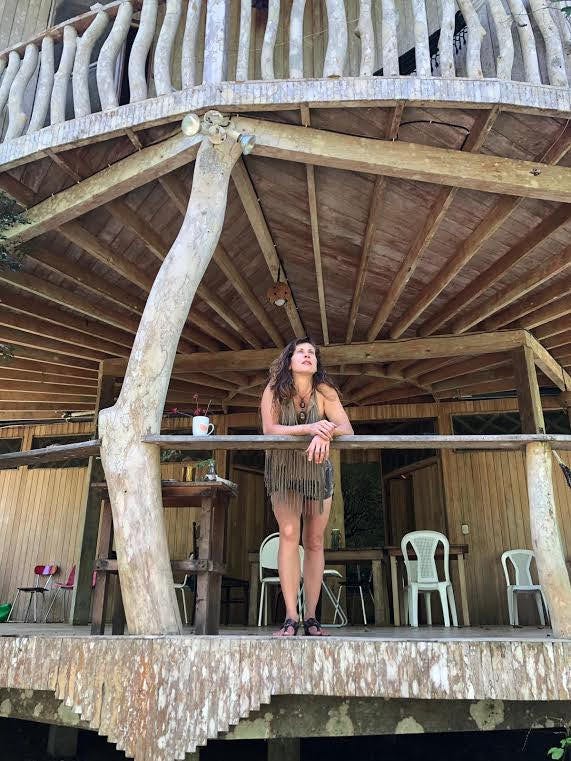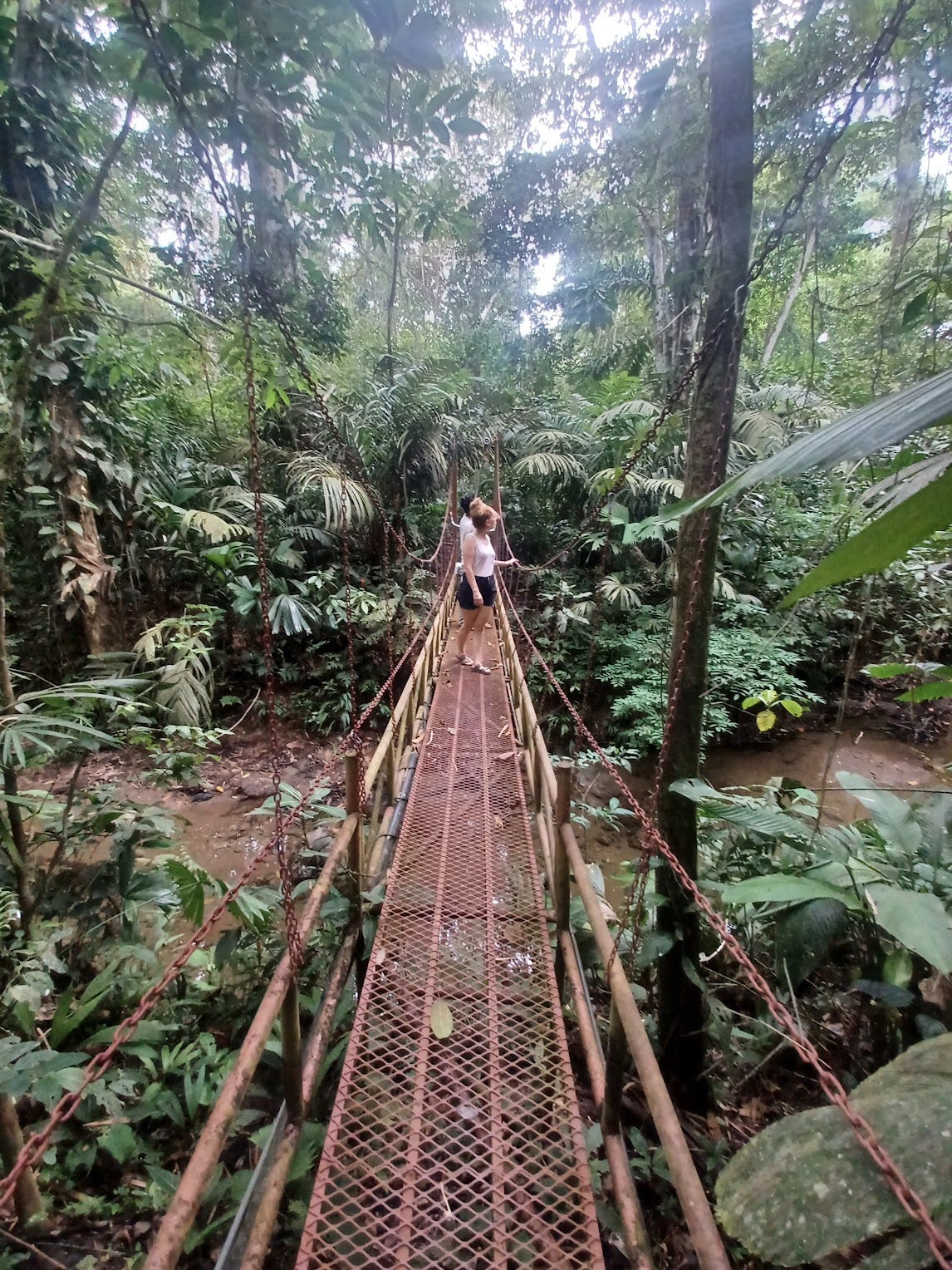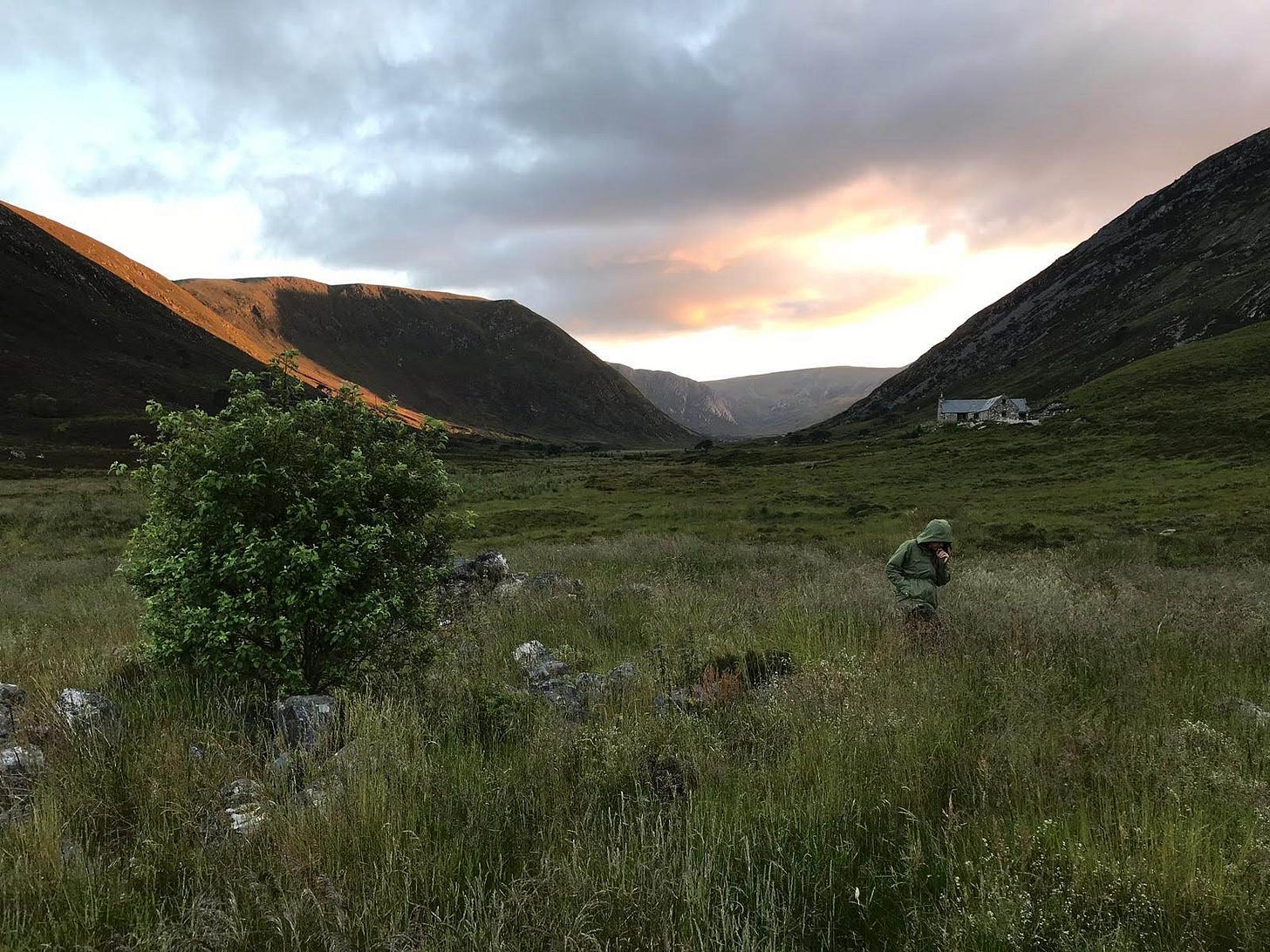It is hard to feel and notice the impact of abstinence. We might refuse to buy conventional bananas shipped from Costa Rican plantations that were once thousands of acres of rainforest but they keep coming to the store anyway, piling up on shelves and eventually rotting. We might carry our reusable water bottle everywhere but plastic bottles still overflow from garbage cans and wind up in the ocean. Animals are still abused in factory farms even though more and more people are choosing to eat from more humane sources, and passenger planes keep taking off to far away lands whether or not they are full. It would require legislation, mass organization and mass abstinence to stop the waves of supply and demand and the destruction they cause.

For me, travel is connection. When I travel, I go to the same places over and over again. I want to know the plants, the people, the culture, the wildlife. I only have so much time on Earth and I’m more interested in deepening existing relationships than skimming the surface of new ones. An introvert at heart, I want to experience rustic, quiet places close to nature where I feel emotionally pulled and connected. I don’t want to escape my daily life though sometimes it is nice to get away and come back with new eyes.
I also know the world is burning and that a single flight is a huge contributor to global warming. When I think about this, I feel as though I should just stay put, tend to the land that my partner and I now steward, grow our food and live simply. But with friends and family scattered around the world and deep emotional connections to other places, that doesn't feel like enough.
I travel to Costa Rica because I am in love with the land, with the countless animals and marvel at the biodiversity. I’m lucky to have close friends there like Encar, a primatologist and founder of the Jaguar Rescue Center who does incredible work on behalf of Costa Rica’s wild animals and rainforest. I collaborate, hoping to do my part to keep the wild wild, too.
I travel to Scotland because it is ancestral land. Something happens to me when I'm there, I feel like I belong. It is land that my bones know, where my ancestors touched the soil and spoke to the sky for thousands of years. A monkey with mixed ethnicity, there are other ancestral lands of mine that I will probably never see or ever know but at least I have Scotland.
I travel to Puerto Rico where my partner’s family resides. It is land that his bones know. He flinches when non-Puerto Ricans tell him how much they love to vacation there. What about me? I ask him. It’s different, you’re with me and you were invited, he tells me. When we spent a few days in San Juan before traveling to see his family in the mountains, we saw signs everywhere that said 'Colonizers Go Home.'
I thought about the strangeness of vacation while I was in Puerto Rico. The harm we can cause when ‘getting away’ from the stress of our daily lives and the places that have come — often reluctantly— to depend on tourists descending on their lands and hopefully, spending lots of money. Travel also can be enriching and beneficial, of course — opening hearts and minds to new cultures and landscapes, even helping sustain ecological projects — but when it comes with a sense of entitlement, it can be incredibly harmful.
When I first came to Puerto Viejo de Limon, Costa Rica in 2008 it was quiet, with gravel roads and constant forest. I am a skittish bike-rider and I felt safe riding my bike everywhere. The area was rustic and quiet with no phone signal or easy wifi and yes, there were parties on the beach and lots of activity but it felt like a special nook, unmolested by human development. I didn’t know it then but 2008 was also the year that my friend Encar would found the Jaguar Rescue Center with her late partner, Sandro.
Now in 2023 roads are paved, and despite ‘Sloth Crossing’ signs, people drive too fast and I would definitely not ride a bike there anymore. There are more cars, and as the area has become more popular, there is more development and more deforestation. Airbnbs are popping up where sloths and monkeys once lived. Encar has rescued too many sloths still clinging to their trees, now logs on the ground. Increasing pressure from a growing human population has been most significant in the last couple of years following the pandemic as people seek landscapes away from the stress of city life. Encar’s work is getting harder. She has animal rescues almost everyday. And yet (at least for now) they rely mostly on tourists that come to daily public tours of the sanctuary to keep their work going.
I justify my presence in Costa Rica with the ecological work I’m doing, with the fact that I’m writing a book that gives voice to the land and other animals, and with the low impact way I travel. But when I passed the banana plantations on the way back to San Jose today my heart ached. When I speak my terrible Spanish and stumble with words, forcing people to speak English, I don’t feel my presence is benign. Although Spanish is a colonizing language, too.
I left my home-base of Brooklyn in 2020 for a rural environment after living there for almost 25 years. Half of those twenty-five years were sustained by doing nature-connection work and traveling to wilder places. One of the things that kept me in New York City for so long is that it attracted people from all over the world. I don't like to live in sheltered environments housing small minds. Sometimes when we stay in one place, we take it for granted. Being rooted in one place is not always synonymous with treating the environment well, let alone being tolerant of other humans and ways of being. Often, we put pressure on landscapes when we stay put and force them to produce.
The other thing that kept me in NYC for longer than I ever imagined — ironically — was I felt as though I was making less of an impact on the environment. I rarely drove, wasn’t occupying pristine land (New Yorkers live stacked on top of each other, after all), and hardly created waste (between composting and using Terracycle through my local Coop) and that felt good to me. But eventually, the overstimulation, a bodily need for true nature, the ‘hustle’ and overwhelming costs wore on me.
I don't have any solutions or answers here but I wanted to share my complicated thoughts and mixed feelings behind recent posts from Costa Rica. It was an emotional trip and I’m certainly not saying I’m ‘doing it right.’ I run annual retreats after all, inviting people to travel and fall in love with the places I love, too. In the retreats I curate, I also do my best to share practices and experiences that can be integrated into our everyday lives. Yes, my offerings are intentional, always ecologically minded and in collaboration with local teachers… Still, I don’t know if I can ever do enough, be mindful enough in this broken world.
The best I can do is live every day in a conscious way, awake to to the impact of my choices while contributing to projects that protect and restore land as I work to steward and nurture land, too.
Birds migrate without a carbon footprint. I listen to the male wood thrush sing in Western Massachusetts in summer and hear his songs in Costa Rica in winter where they often find refuge in shade grown coffee farms. Sadly, like many songbirds — especially those of the forest — wood thrush populations have declined seriously in recent years due to fragmented landscapes.
Areas that other animals, including humans, call home are changing. Climate change, housing developments, fragmented landscapes and loss of migration corridors make it hard for animals to return home or to find new, safe places to nest.
I think about the fact that for over 95 percent of human existence, we have been nomads, carrying and taking only what was essential and dependent on the availability of forageable fruit, nuts, roots, and greens, the movement of other animals, and changes in weather. Sometimes I wonder if humans are even meant to stay in one place. Certainly, we’re not meant to accumulate so much unnecessary stuff that exhausts the Earth while keeping us bogged down and tethered.
As landscapes become more fractured, we might be forced to migrate like the wood thrush and travel more lightly, too.











I am not much of a traveller but I really resonated with a lot of what you've said here. I spend a lot of time, money, and energy to do my best to walk lightly here on earth but it definitely doesn't feel like my individual efforts make any difference whatsoever. I have taken to thinking of the human population as being part of the universe's absolute worst group project - some are going above and beyond, doing others' work, worrying, trying to control outcomes, etc., etc., while so many are stuck in denial and/or are still too comfortable with their lives to make those necessary changes. And let's not forget the complex corporation/government/oil and gas/etc. interests that are very difficult to dislodge. As much as I hate to say it, I think that things will have to get worse before people start to make real changes. The pressure is high and it's getting hotter (literally and figuratively). I have come to believe that all we can do is what we can do: use our gifts to do our best (as you do through your writing and work on the land/with the beasties), try to walk lightly with what we purchase and consume, be mindful of the colonial relationships that we are immersed in. Like all the big issues, there are no easy answers to this one!